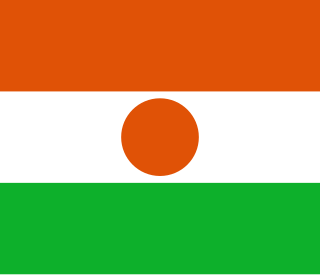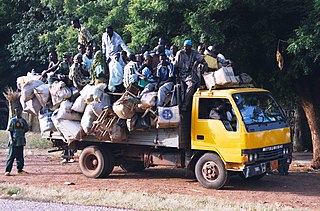Related Research Articles

The culture of Niger is marked by variation, evidence of the cultural crossroads which French colonialism formed into a unified state from the beginning of the 20th century. What is now Niger was created from four distinct cultural areas in the pre-colonial era: the Djerma dominated Niger River valley in the southwest; the northern periphery of Hausaland, made mostly of those states which had resisted the Sokoto Caliphate, and ranged along the long southern border with Nigeria; the Lake Chad basin and Kaouar in the far east, populated by Kanuri farmers and Toubou pastoralists who had once been part of the Kanem-Bornu Empire; and the Tuareg nomads of the Aïr Mountains and Saharan desert in the vast north. Each of these communities, along with smaller ethnic groups like the pastoral Wodaabe Fula, brought their own cultural traditions to the new state of Niger.

Dosso is a city in the south-west corner of Niger. It lies 130–140 kilometres (81–87 mi) south-east of the capital Niamey at the junction of the main routes to Zinder and Benin. The eighth-most populous town in Niger and the largest in Dosso Region, it had an official population during the 2001 census of 43,561. The population grew to 58,671 in the 2012 census. It is the capital of its region - which covers five departments in the southwestern corner of the nation - as well as of its own department, Dosso Department. The city itself lies at the centre of its own Urban Commune.
Birni-N'Konni is a town in the Tahoua Region of Niger, lying immediately north of the border of Nigeria and west of seasonal Maggia River. It is an important market town and transport hub and as of the 2012 census had a population of 63,169. The town is the historic centre of the small pre-colonial Hausa state of Konni. The name comes from the Hausa for "Walled Town of Konni", and many Hausa towns designate the old citadel neighbourhood the "Birni".

Maradi is the second largest city in Niger and the administrative centre of Maradi Region. It is also the seat of the Maradi Department and an Urban Commune.

The Nigerien Progressive Party – African Democratic Rally is a political party in Niger. It was the leading political party of the pre-independence era, becoming the sole legal party of the First Republic (1960–1974). It was led by Niger's first President, Hamani Diori. After the end of military rule, the party reappeared as a minor parliamentary party led by Diori's son, Abdoulaye Hamani Diori.

Islam in Niger accounts for the vast majority of the nation's religious adherents. The faith is practiced by more than 99.3% of the population, although this figure varies by source and percentage of the population who are classified as Animist. The vast majority of Muslims in Niger are Malikite Sunni with Salafi influences. Many of the communities who continue to practice elements of traditional religions do so within a framework of syncretic Islamic belief, making agreed statistics difficult. Islam in Niger, although dating back more than a millennium, gained dominance over traditional religions only in the 19th and early 20th centuries, and has been marked by influences from neighboring societies. Sufi brotherhoods have become the dominant Muslim organization, like much of West Africa. Despite this, a variety of interpretations of Islam coexist—largely in peace—with one another as well as with minorities of other faiths. The government of Niger is secular in law while recognising the importance of Islam to the vast majority of its citizens.

The Zarma people are an ethnic group predominantly found in westernmost Niger. They are also found in significant numbers in the adjacent areas of Nigeria and Benin, along with smaller numbers in Burkina Faso, Ivory Coast, Ghana, Togo, and Sudan. In Niger, the Zarma are often considered by outsiders to be of the same ethnicity as the neighboring Songhai proper, although the two groups claim differences, having different histories and speaking different dialects. They are sometimes lumped together as the Zarma-Songhay or Songhay-Zarma.
Moumouni Adamou Djermakoye was a Nigerien politician and the President of the Nigerien Alliance for Democracy and Progress. He was an important minister during the regime of Seyni Kountché and subsequently served as Niger's Ambassador to the United States from 1988 to 1991; later, after founding the ANDP, he served as President of the National Assembly of Niger from 1993 to 1994. He was the ANDP's candidate in four presidential elections, beginning in 1993; he was also a deputy in the National Assembly from 1999 to 2009 and the President of the High Court of Justice from 2005 to 2009.

Abdou Moumouni University was formerly the University of Niamey from 1974 to 1994. On the right bank of the Niger River in Niamey, its students and faculty have historically been involved in protest movements in the capital.

The following outline is provided as an overview of and topical guide to Niger:
The Djermakoy is the title given to rulers of the Djerma/Zarma states in what is now southwest Niger. From the 1890s, the Djermakoy of the Dosso Kingdom came to dominate the entire Djerma area, and remaining local Djermakoy owed allegiance to him.

Téra is a department of the Tillabéri Region in Niger. Its capital lies at the city of Téra. As of 2011, the department had a total population of 579,658 people.

The Sultanate of Damagaram was a Muslim pre-colonial state in what is now southeastern Niger, centered on the city of Zinder.

Niger–Nigeria relations refer to the current and historical relationship between Niger and Nigeria, two neighbouring countries in West Africa. Relations are based on a long shared border and common cultural and historical interactions.
Independence Day in the Republic of Niger is commemorated on August 3, marking the nation's independence from France in 1960. Since 1975, it is also Arbor Day, as trees are planted across the nation to aid the fight against desertification.

The Alliance of the Forces of Change was one of the two large political coalitions which contested for power in Niger from 1991 to 1996.
The 1974 Nigerien coup d'état was a largely bloodless military insurrection which overthrew the first postcolonial government of Niger. The government that followed, while plagued by coup attempts of its own, survived until 1991.

Seasonal migration, locally called the Exode, plays an important part of the economic and cultural life of the West African nation of Niger. While it is a common practice in many nations, Niger sees as much as a third of its rural population travel for seasonal labour, during the Sahelian nation's long dry season. Common patterns of seasonal travel have been built up over hundreds of years, and destinations and work vary by community and ethnic group.
The Maouri people are an ethnic group in western Africa. They are one of the major ethnic groups of Niger, and are concentrated around the Dallol Maouri of the Niger River, extending from Matankari, near Niamey, to Gaya. They are a subgroup of the Hausa people, and speak both the Hausa language and the Djerma language. When using the Zarma language, they are known as the Arawa people.

The Nigerien Action Bloc was a political party in Niger in 1955 and 1956 led by Issoufou Saidou Djermakoye, a traditional chief and former chairman of the Nigerien Progressive Party (PPN).
References
- ↑ It was these Hausa states who largely resisted the Sokoto Caliphate in its conquest of more southern Hausa cities. For the period of colonial contact, see: Finn Fuglestad. A History of Niger: 1850-1960. Cambridge University Press (1983) ISBN 0-521-25268-7
Kimba Idrissa, Les populations du "Niger" occidental au XIXe siecle et leurs reactions face a la colonisation (1896-1906). Paris (1981). - ↑ The traditional ruler of Dosso is called Zarmakoy or Djermakoye, an autochthonous title meaning literally "King of Djermas", where koy means "ruler", "lord", or "king" in Zarma (or Djerma) language. See Peace Corps/Niger, "An Introduction to the Zarma Language".
- ↑ Christopher Wise. Yambo Ouologuem: Postcolonial Writer, Islamic Militant. Lynne Rienner Publishers (1999) ISBN 0-89410-861-1 pp. 168-9
- ↑ Paul E. Lovejoy and J. S. Hogendorn. Revolutionary Mahdism and Resistance to Colonial Rule in the Sokoto Caliphate, 1905-6. The Journal of African History, Vol. 31, No. 2 (1990), pp. 217-244.
- ↑ Decalo (1979), p.95: "Most of the population of the town claims chiefly descent and hence is 'forbidden' to work or pay taxes, or to engage in commerce, living off the generosity of the Djermakoy who receives a variety of gifts from his commoner subjects."
- ↑ Dosso: Accueil populaire réservé au Sultan Maïdanda Saidou Djermakoye. nigerinter.com. December 2nd, 2015.
- James Decalo. Historical Dictionary of Niger. Scarecrow Press/ Metuchen. NJ - London (1979) ISBN 0-8108-1229-0
- Finn Fuglestad. A History of Niger: 1850-1960. Cambridge University Press (1983) ISBN 0-521-25268-7
- Christian Lund. Law, Power and Politics in Niger: Land Struggles and the Rural Code in Niger. LIT Verlag Berlin-Hamburg-Münster (1998). ISBN 3-8258-3405-0 p. 66
- Andreas Neef. "Ethnic Groups in Niger". in Adapted Farming in West Africa: Issues, Potentials and Perspectives. F. Graef, P. Lawrence and M. von Oppen (Editors). Verlag Ulrich E. Grauer, Stuttgart, (2000). ISBN 3-86186-315-4
- Much of this article was translated from French language Wikipedia's fr:Djermas.